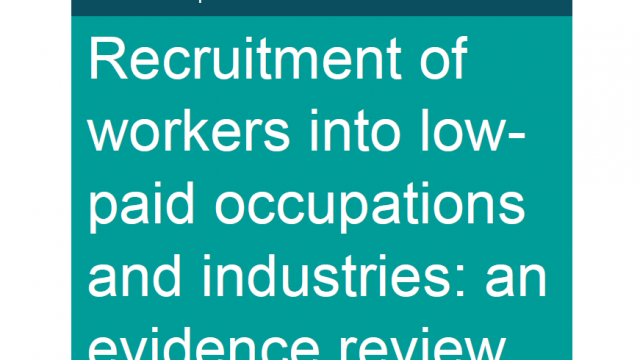Exploring the Pay and Progression Experiences of Women Aged Over 50 in Scotland
This project will explore experiences of pay and progression among women aged over 50 years old in Scotland. Through qualitative research with both employers and employees in specific sectors, the project will investigate barriers to equal pay and progression for women over 50, and inform new guidelines for best practices by employers.

Summary & aims
The project involved semi-structured video or telephone interviews with 17 women over 50 years old and with 13 employers. We focused on two specific sectors in Scotland: the finance and insurance sector, and the information and communications sector.
The research illustrates how flexible work, and part-time work in particular, is vitally important for many women over 50 given their often-substantial caring responsibilities for spouses, children, grandchildren, and elderly parents. The report also explores women’s concerns in other areas, including recruitment and promotion processes, skill-gaps, and the menopause.
The research also finds that while many women are concerned about age discrimination, employers often fail to consider age as an important aspect of diversity and inclusion in the workplace. The report recommends that employers should increase their monitoring of pay, progression and training by age. Additionally, the report recommends that employers would benefit from increased support and guidance in addressing age discrimination in the workplace.
The study was commissioned by the Fair Work Convention, an independent body that advises the Scottish Government. The Fair Work Convention published a response to the research report, in which they call for the Scottish Government, employers, trade unions and other stakeholders to participate in improving workplace practices to improve fair work for women over 50.
Methodology
We carried out 13 interviews with employers in Scotland in January and February 2022. These interviews were all conducted by video link and lasted approximately 60 mins. Employers were not offered any reward for their participation. Six of these employers were within the Finance and Insurance sector, and seven were within the Information and Communication sector. Six of these organisations had under 20 employees, two had between 50-80 employees, and five had over 250 employees. Out of these five larger organisations, three organisations had 1000 or more employees. The majority of the employers that we interviewed were based only in Scotland, although six employers had branches or parent companies outside Scotland.
In smaller organisations, interviews were typically conducted with managing directors or CEOs. In larger companies, interviews were conducted with HR directors or HR managers. These companies were based in a wide range of locations throughout Scotland, including Edinburgh, Dundee, Glasgow, and Inverness. All of the organisations that we interviewed employed at least two or more women over 50, with the exception of one organisation which had employed women over 50 in the past but no longer did.
In order to recruit employers, we contacted 1787 employers via email in the relevant sectors using an employer database supplied by a company called Market Location. We received expressions of interest from 20 employers, and we ultimately selected 17 10 employers who met our requirements for interview. We selected employers based on their area of work, the number of women over 50 in their workforce, their total number of employees, and their location in Scotland. Our remaining three employers were recruited through existing contacts of the Fair Work Convention.
In addition, we carried out 17 semi-structured interviews with women over 50 in Scotland in January and February 2022. The interviews were carried out by telephone or video link and lasted around 60 minutes each. Women were paid £40 in the form of a shopping voucher for their participation. Nine women worked in the Finance and Insurance sector, while eight worked in the Communication and Information sector.
Approximately half the women we interviewed were between 55 and 60 years old, while a quarter of our sample were between 50 and 55 years old, and a further quarter were between 60 and 65 years old. They lived in a variety of locations across Scotland, including Glasgow, Stirling, Dundee, Dunfermline, Edinburgh, and Inverness.
All the women were employed at the time of the interview, with the exception of one woman who had taken early retirement from a large bank a few years earlier. Our sample included women with varying levels of pay and responsibility in the workplace, ranging from senior managers in the finance sector, to administrative and call-centre workers who tended to be on lower pay and have lower levels of responsibility.
In order to recruit women, we asked every employer that we interviewed to circulate information via email to their employees about our research project. This email invited women over 50 to contact us directly using a private email if they wished to participate in our research. Both employers and employees were assured their confidentiality and anonymity would be protected at every stage of the research. The majority of the women that we interviewed were recruited in this way. In addition, we also recruited a small number of women using a ‘snowball technique’: this involved asking women that we interviewed to circulate details of our research project to their colleagues. Finally, we recruited four women through the existing networks of the Fair Work Convention, particularly trade union networks. In total, we interviewed 11 women at organisations where we had also conducted an employer interview. The women in our sample were drawn from a total of 10 different employers, meaning that on average we interviewed two women at each employer.
All the names of employers and employees used in the subsequent report are pseudonyms in order to protect the privacy of research participants. We have also changed the job titles, ages, and other characteristics of employees, while ensuring that we retain the overall integrity of the data by choosing descriptions that reflect the overall social structures identified in the research. Similarly, we have made some changes to descriptions of employers and the nature of their work, while maintaining the overall integrity of the data
Findings and Recommendations
- women frequently expressed a reluctance to pursue opportunities for progression, including internal and external opportunities, and – to a lesser extent – opportunities for training. This reluctance was typically explained by women as a wish to avoid the potential stress and pressure that they connected with progression.
- women identified factors relating to their age and gender as key barriers both to their progression and their general sense of well-being in the workplace. Women also spoke in depth about their wishes around working arrangements – and associated concerns around their health, experiences of the menopause, and caring responsibilities for others – and how these experiences contributed to their reluctance to pursue opportunities for progression.
- All of the employers interviewed recognised, to varying degrees, that gender could be a barrier to progression in the workplace. By comparison, few employers in the study recognised that age – and particularly the intersection between age and gender – may also present a significant barrier to progression in the workplace.
- Employers did recognise some of the issues faced by women over 50, particularly around the menopause, caring responsibilities, and working arrangements. They provided varying degrees of support in relation to these issues. Some employers also expressed concerns about what they saw as additional age-related issues in the workplace, such as training older workers in new technology, and the need to consider issues around retirement and succession.
Overall, the findings speak to the central role that workplace practices have in shaping the pay and progression experiences of women over 50. They also speak to the importance of the five dimensions of fair work as set out in the Fair Work Convention’s Framework: effective voice, opportunity, security, fulfilment, and respect. The recommendations focus particularly on the dimensions of opportunity, respect, and effective voice,
Katharine Stockland, Senior Social Researcher at NIESR, said:
“This report shows that women over 50 experience barriers in the workplace that are specific both to their age and gender. In order to address these challenges around pay and progression experienced by this group of women, employers must reflect on their workplace practices and consider to what extent their training, support and promotion opportunities reflect the needs of this group of women. Especially in the context of labour shortages that have been driven partly by older workers dropping out of the labour market, employers should act now”.
Fair Work Convention Co-Chair’s Mary Alexander and Patricia Findlay added:
“We know the challenges faced by women at work do not simply start when a woman turns 50. The impacts of workplace policies and practices that systematically disadvantage women build cumulatively over an individual’s career. What this research demonstrates is that the intersection of age and gender is uniquely shaping women’s experiences of work in ways that are leaving older women significantly worse off both in career progression and in pay.
The Fair Work Convention calls on employers to take urgent action to support older women at work. Employers, the Scottish Government and trade unions all have a role to play in addressing this longstanding and deep-seated inequality, and it cannot just be left to individual older women to address these difficult issues on their own. Our research and response piece gives clear actions that employers and other can take today to improve fair work for older women.”
Principal Investigator

Co-Investigator










